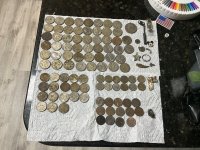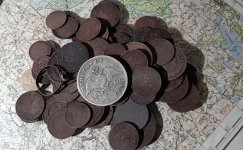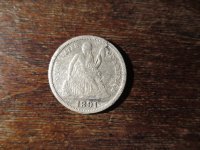piratediver
Sr. Member
These two posts are from SUBARCH, normally the domain of hard line archaeologists and
offer hope for some middle ground.
Rich Lundin wrote:
> Pete:
>
> There you go! Well said. I agree that you can accomplish a lot by
> talking over a beer. In the 1970's Wondjina Research Institute (WRI)
> was looking for the deeply buried (+10m) remains of the 1565 fleet of
> Jean Ribault on the east coast of Florida. It was and remains a
> personal quest for me as an archaeologist as the bones of my ancestor
> from this colony lie somewhere in the sands of Florida.
>
> My BEST informants and, later assistants for the beach and back beach
> archaeogeophysical surveys (metal detector, magnetic, radiometric, and
> VLF-EM) were elderly metal detectorists who came out after every
> storm to "work" the beaches and fund thin, heavily abraded, silver
> alloy disks with no recognizable markings. Over beers, they showed me
> their "treasures" and I told them the history of the area and the
> possible history of their artifacts. It was a good exchange and, to
> the person, they volunteered to help with the surveys. We didn't find
> the Emirillon or the Trinfitie but we taught these Elderfolk and their
> kids and grandkids the value of preserving history and they taught me
> much about an inherent love and reverence of the past that most
> people have.
>
> Since then, I have worked with salvors, fishermen, recreational divers
> etc. as you said, "anyone who will talk with me" and have recruited
> more volunteers and site stewards that way.
>
> I really believe that the issue is money and that if more, young
> archaeologists were hired as interns by the absolve companies and
> didn't have to "fear" for their future professional "reputations" and
> more, experienced underwater and historical archaeologists, who were
> old enough not to care about their "future" professional careers but
> still had the "fire" to good, publishable, work that the difference
> between what is being done in underwater "salvage" archaeology and
> what is currently done in terrestrial "salvage" archaeology would
> become less and less.
>
> With the technology needed for finding and working wrecks in deep
> water, the videodocumentation of the careful excavation of these sites
> and retrieval of artifacts is what is the real "treasure" and the
> stuff that the media people and the public will pay for. If there is
> an archaeological intern (low cost but eagar) working the controls of
> the deepwater excavation\recovery\mapping system with an experienced,
> qualified, underwater archaeologist (higher cost but not prohibitive
> in these days of $100/hr. auto repairs) on the boat supervising data
> collection, artifact identification and conservation all as a part of
> a professional team. What, then, is the difference between that team
> and an archaeologist and a backhoe operator team working together on a
> terrestrial salvage archeology project?
>
> I am a firm believer that "It doesn't make any difference if it is a
> black cat or a white cat-as long as it catches mice" As long as the
> criteria for archaeological work are met as per my recent message
> about "ducks" and archaeologists, then it should be possible to have
> training programs for archaeosalvors that "catch mice".
>
> Again, Well Said, Pete!
>
> Rich Lundin MA, RPA, ISAP
> Consulting Historical Archaeologist & Remote Sensing Specialist
> Director, Wondjina Research Institute
> ----- Original Message ----- From: <[email protected]>
> To: <[email protected]>
> Sent: Wednesday, September 19, 2007 3:15 PM
> Subject: Building bridges
>
>
>> As some of the list knows I am a wreck diver with an interest in
>> marine history and archaeology. My personal interests are with the
>> age of steam and the transition period of 1820-1850 or so. My
>> vocation is a Manufacturing Engineer at a US Aerospace firm. I have a
>> BS in Chemistry and an MS in Engineering Management.
>>
>> I am not an archaeologists, I am a wreck diver.
>>
>> But as a diver I talk to everyone who will talk to me and have found
>> that over a good beer there really is a lot of commonality between
>> the two poles of this debate.
>>
>> On the theme of Building Bridges and doing good science and getting
>> it all published I would like to ask the academic side a question:
>>
>> Would you have any problem with a commercial salvage company,
>> treasure hunters if you like, having some of your grad students come
>> in as interns (unpaid, maybe paid - what a thought interns getting
>> some $$ without 100 hours of grant
>> writing) to work on their collections and conservation labs and
>> publish what they do?
>>
>> Now to the commercial salvage companies:
>>
>> Will you let interns (paid/unpaid) come into your labs and
>> conservation areas to do research and let them publish, with academic
>> independence as long as it doesn't interfere with some Intellectual
>> Property agreements, what they do?
>>
>> Pete Johnson
>> A wreck diver on the sidelines.
>>
>> PS, if anyone would like to work on a twin engine steamboat from 1825
>> (sunk in 1831) with engines and boilers most likely fully intact and
>> buried in deep mud, sixty feet down in beautiful Long Island Sound,
>> please get in touch with me, I have one.
>>
>>Pirate Diver
offer hope for some middle ground.
Rich Lundin wrote:
> Pete:
>
> There you go! Well said. I agree that you can accomplish a lot by
> talking over a beer. In the 1970's Wondjina Research Institute (WRI)
> was looking for the deeply buried (+10m) remains of the 1565 fleet of
> Jean Ribault on the east coast of Florida. It was and remains a
> personal quest for me as an archaeologist as the bones of my ancestor
> from this colony lie somewhere in the sands of Florida.
>
> My BEST informants and, later assistants for the beach and back beach
> archaeogeophysical surveys (metal detector, magnetic, radiometric, and
> VLF-EM) were elderly metal detectorists who came out after every
> storm to "work" the beaches and fund thin, heavily abraded, silver
> alloy disks with no recognizable markings. Over beers, they showed me
> their "treasures" and I told them the history of the area and the
> possible history of their artifacts. It was a good exchange and, to
> the person, they volunteered to help with the surveys. We didn't find
> the Emirillon or the Trinfitie but we taught these Elderfolk and their
> kids and grandkids the value of preserving history and they taught me
> much about an inherent love and reverence of the past that most
> people have.
>
> Since then, I have worked with salvors, fishermen, recreational divers
> etc. as you said, "anyone who will talk with me" and have recruited
> more volunteers and site stewards that way.
>
> I really believe that the issue is money and that if more, young
> archaeologists were hired as interns by the absolve companies and
> didn't have to "fear" for their future professional "reputations" and
> more, experienced underwater and historical archaeologists, who were
> old enough not to care about their "future" professional careers but
> still had the "fire" to good, publishable, work that the difference
> between what is being done in underwater "salvage" archaeology and
> what is currently done in terrestrial "salvage" archaeology would
> become less and less.
>
> With the technology needed for finding and working wrecks in deep
> water, the videodocumentation of the careful excavation of these sites
> and retrieval of artifacts is what is the real "treasure" and the
> stuff that the media people and the public will pay for. If there is
> an archaeological intern (low cost but eagar) working the controls of
> the deepwater excavation\recovery\mapping system with an experienced,
> qualified, underwater archaeologist (higher cost but not prohibitive
> in these days of $100/hr. auto repairs) on the boat supervising data
> collection, artifact identification and conservation all as a part of
> a professional team. What, then, is the difference between that team
> and an archaeologist and a backhoe operator team working together on a
> terrestrial salvage archeology project?
>
> I am a firm believer that "It doesn't make any difference if it is a
> black cat or a white cat-as long as it catches mice" As long as the
> criteria for archaeological work are met as per my recent message
> about "ducks" and archaeologists, then it should be possible to have
> training programs for archaeosalvors that "catch mice".
>
> Again, Well Said, Pete!
>
> Rich Lundin MA, RPA, ISAP
> Consulting Historical Archaeologist & Remote Sensing Specialist
> Director, Wondjina Research Institute
> ----- Original Message ----- From: <[email protected]>
> To: <[email protected]>
> Sent: Wednesday, September 19, 2007 3:15 PM
> Subject: Building bridges
>
>
>> As some of the list knows I am a wreck diver with an interest in
>> marine history and archaeology. My personal interests are with the
>> age of steam and the transition period of 1820-1850 or so. My
>> vocation is a Manufacturing Engineer at a US Aerospace firm. I have a
>> BS in Chemistry and an MS in Engineering Management.
>>
>> I am not an archaeologists, I am a wreck diver.
>>
>> But as a diver I talk to everyone who will talk to me and have found
>> that over a good beer there really is a lot of commonality between
>> the two poles of this debate.
>>
>> On the theme of Building Bridges and doing good science and getting
>> it all published I would like to ask the academic side a question:
>>
>> Would you have any problem with a commercial salvage company,
>> treasure hunters if you like, having some of your grad students come
>> in as interns (unpaid, maybe paid - what a thought interns getting
>> some $$ without 100 hours of grant
>> writing) to work on their collections and conservation labs and
>> publish what they do?
>>
>> Now to the commercial salvage companies:
>>
>> Will you let interns (paid/unpaid) come into your labs and
>> conservation areas to do research and let them publish, with academic
>> independence as long as it doesn't interfere with some Intellectual
>> Property agreements, what they do?
>>
>> Pete Johnson
>> A wreck diver on the sidelines.
>>
>> PS, if anyone would like to work on a twin engine steamboat from 1825
>> (sunk in 1831) with engines and boilers most likely fully intact and
>> buried in deep mud, sixty feet down in beautiful Long Island Sound,
>> please get in touch with me, I have one.
>>
>>Pirate Diver







